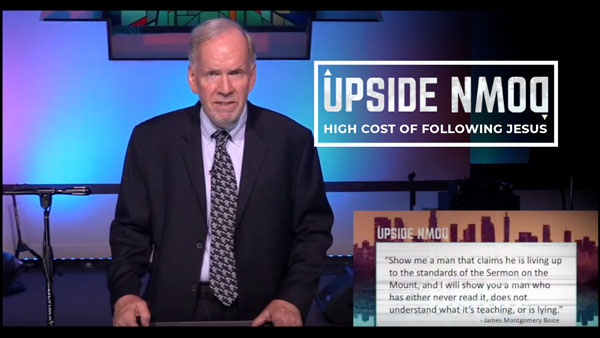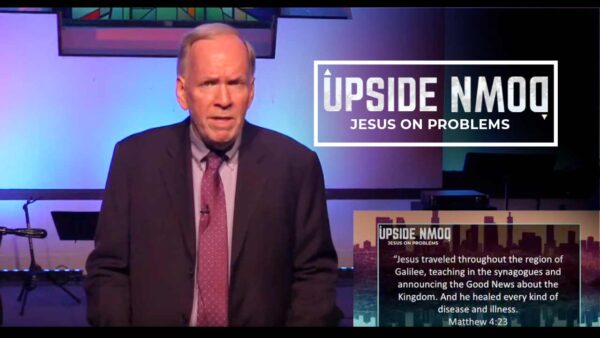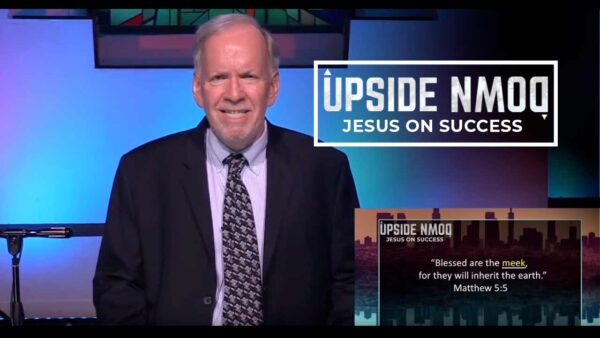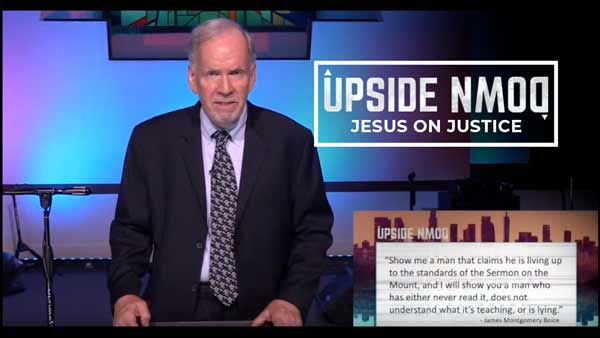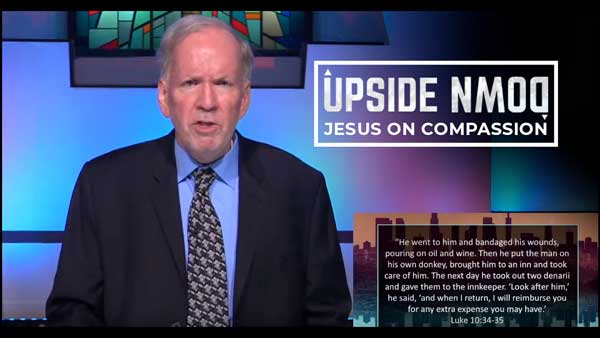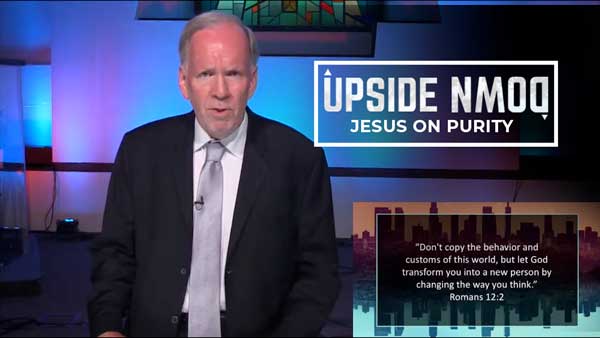Dr. Rick Mandl - June 28, 2020
Blessed Are Those Who Mourn
Sermon Manuscript: Upside Down Message 2- Blessed Are Those Who Mourn
Sermon preached by Dr. Rick Mandl, Eagle Rock Baptist Churc, June 27 & 28, 2020Recorded in Los Angeles, CA.
Last week we began our Upside-Down series during which we are looking at the portions of scripture known as the Beatitudes, found at the start of the Sermon on the Mount in Matthew chapter 5. This sermon took place early in Jesus’ ministry. Let’s look at the context starting at Matthew 4 and verse 23. “Jesus traveled throughout the region of Galilee, teaching in the synagogues and announcing the Good News about the Kingdom. And he healed every kind of disease and illness. News about him spread as far as Syria, and people soon began bringing to him all who were sick. And whatever their sickness or disease, or if they were demon possessed or epileptic or paralyzed—he healed them all. Large crowds followed him wherever he went—people from Galilee, the Ten Towns, Jerusalem, from all over Judea, and from east of the Jordan River. One day as he saw the crowds gathering, Jesus went up on the mountainside and sat down. His disciples gathered around him, and he began to teach them.” Jesus has been travelling around teaching about the good news about the kingdom of God, and healing all kinds of diseases and ailments. As you can imagine, this drew a lot of followers. After all, who wouldn’t want to follow someone who can heal you if you are sick, drive out demons when you are possessed, and who announces good news of God’s kingdom when you are being oppressed by the Roman government?
Wanting to address this crowd of followers, Jesus went up on a hill, sat down, and began to speak to them. And I think what He said must have come as a shock to His listeners. Let’s read these verses again: “Blessed are the poor in spirit, for theirs is the kingdom of heaven. Blessed are those who mourn, for they will be comforted. Blessed are the meek, for they will inherit the earth. Blessed are those who hunger and thirst for righteousness, for they will be filled. Blessed are the merciful, for they will be shown mercy. Blessed are the pure in heart, for they will see God. Blessed are the peacemakers, for they will be called children of God. Blessed are those who are persecuted because of righteousness, for theirs is the kingdom of heaven. Blessed are you when people insult you, persecute you and falsely say all kinds of evil against you because of me. Rejoice and be glad, because great is your reward in heaven, for in the same way they persecuted the prophets who were before you.”
Last week we looked at the first Beatitude... Blessed are the poor in spirit, for theirs is the kingdom of heaven. We saw that to be poor in spirit means that we have an accurate understanding of our own spiritual poverty, and of the fact that we need the forgiveness that God offers. That’s the starting point. And then, having become His children, we endeavor to live a life that puts God’s Kingdom first. We saw that the place to start is to ...
- Give God the first part of your day
- Give God the first part of your week
- Give God the first part of your finances and
- Give God the first part of your relationships
Today we are going to look at the second Beatitude, “Blessed are those who mourn, for they will be comforted.” Imagine the thoughts of the crowd, when they heard those words... “First He says we have to be poor in spirit to be blessed... Now He’s telling us we have to mourn? Neither of those things seem very “blessed.” Let’s have some more miracles, Jesus, that’s what we’ve come to see!” Blessed are they that mourn? This seems like the most paradoxical of the beatitudes. Is Jesus really saying ... “Happy are the sad?” It makes no sense. So let’s dig a little deeper and consider
What is it we’re supposed to mourn?
- We mourn our own sinfulness.
This second Beatitude flows naturally from the first. When we recognize our own spiritual poverty, mourning is the logical reaction. Theologian William Barclay explains it this way: “Blessed is the man who is moved to bitter sorrow at the realization of his own sin. The way to God is the way of the broken heart. Penitence is the first act of the Christian life, and penitence is sorrow.”
There is an episode in the life of King David which illustrates this. You remember David - the one who single-handedly stood up against the giant Goliath to defend the name and reputation of God. David, who was called “a man after God’s own heart.” Yet David was also a man who sinned greatly, and who mourned his own sin. 2 Samuel 11 and 12 tells us how it happened. David was hanging out in Jerusalem at a time when hi troops were off at war. One night he couldn’t sleep so he went out for a walk on the roof of his palace. Looking down, he saw a woman bathing, an unusually beautiful woman. Her name was Bathsheba. He had her brought to his house and he slept with her, knowing full well that she was married to one of his soldieres who was out at battle. The woman became pregnant and David came up with a plan to cover up what he had done. He called Bathsheba’s husband, Uriah, back to Jerusalem and after enquiring how the battle was going, he told Uriah to go home, wash up, and rest. David was counting on Uriah going home, and sleep with his wife, thereby explaining her pregnancy. However, the next morning, David found out that Uriah had not gone home. He had slept at the David’s palace entrance with the other palace guard. When David questioned him, Uriah said, “How could I go home and enjoy being with my wife, when my brothers in arms are in danger, sleeping out in an open field? “ So David tried again. He had Uriah stay another night, and this time he got him drunk and then sent him home. But, even in his drunken state, Uriah did not go home to his wife. He again slept with the palace guard.
In desperation, David tried another tactic, he sent Uriah back to battle with a note for the commanding general. He told the commander to put Uriah at the front of the battle line, and then withdraw the other troops from him so that Uriah would be killed. And that’s exactly what the commander did, and Uriah was indeed killed in the battle. After an acceptable time, David brought Bathsheba to his house, and took her as one of his wives. Bathsheba had a son, and I imagine David heaved a sigh of relief that his plan had worked, and his sin had not been discovered. He had covered it up, and successfully swept it under the rug. But you can’t hide things from God, no matter how elaborately you try. God sent his prophet, Nathan, to David. And to make a long story short, Nathan confronts David about his sin, and David repents. Listen to some of David’s words of grief over his sin: From Psalm 38 “My guilt overwhelms me - it is a burden too heavy to bear. My wounds fester and stink because of my foolish sins. I am bent over and racked with pain. All day long I walk around filled with grief. A raging fever burns within me, and my health is broken. I am exhausted and completely crushed. My groans come from an anguished heart.” And from Psalm 51 "Wash me clean from my guilt. Purify me from my sin. For I recognize my rebellion; it haunts me day and night. Against you, and you alone, have I sinned; I have done what is evil in your sight. You will be proved right in what you say, and your judgment against me is just” (Psalm 51:2-4). When we are confronted with God’s holiness, and who He calls us to be as His children, and then we see our own sinfulness - we mourn.
Just like Isaiah did when he had a vision of God sitting on the throne in His temple. Isaiah 6:5: Woe is me, for I am ruined! Because I am a man of unclean lips, and I live among a people of unclean lips; for my eyes have seen the King, the Lord of hosts." Just like the tax collector did when with downcast eyes, he beat his breast and said, "God, be merciful to me, the sinner." Just like Paul did when confronted with his own propensity to do the very things he knew he shouldn’t and didn’t want to do. Romans 7:24: “Oh wretched man that I am! Who will set me free from this body of death?” We mourn over our own sinfulness. We also mourn over the brokenness of this world. When God created the world, it was good. Adam and Eve lived in perfect union with God and with one another. When sin entered the world, everything was affected: relationships with God, relationships with one another, the earth itself. When we look at the brokenness of the world, we should mourn. This is what the prophet Habakkuk was doing when he cried out to God: “How long, O Lord, must I call for help? But you do not listen! “Violence is everywhere!” I cry, but you do not come to save. Must I forever see these evil deeds? Why must I watch all this misery? Wherever I look, I see destruction and violence. I am surrounded by people who love to argue and fight. The law has become paralyzed, and there is no justice in the courts. The wicked far outnumber the righteous, so that justice has become perverted.”
Pastor Paul David Tripp makes this observation: “Mourning embraces the tragedy of the fall. Mourning acknowledges that the world is not the way God meant it to be. Mourning cries out for God’s redeeming, restoring hand. Mourning acknowledges the suffering of others. Mourning is about something bigger than the fact that life is hard. Mourning grieves what sin has done to the cosmos and longs for the Redeemer to come and make his broken world new again.” We mourn our own sinfulness. We mourn the brokenness of the world. We should also mourn the lostness of people around us. We see this when Jesus mourned over Jerusalem.
Luke 13:34 he said... “O Jerusalem, Jerusalem, the city that kills the prophets and stones God’s messengers! How often I have wanted to gather your children together as a hen protects her chicks beneath her wings, but you wouldn’t let me.” And again in Luke 19:41 “When (Jesus) approached Jerusalem, He saw the city and wept over it.” And in Matthew 9:36-38: "When (Jesus) saw the crowds, he had compassion on them because they were confused and helpless, like sheep without a shepherd. He said to his disciples, “The harvest is great, but the workers are few. So pray to the Lord who is in charge of the harvest; ask him to send more workers into his fields.” Lost people were important to Jesus, so He spent time with them, and that caused the religious leaders to grumble. Luke 15 tells us that... Tax collectors and other notorious sinners often came to listen to Jesus teach. This made the Pharisees and teachers of religious law complain that he was associating with such sinful people—even eating with them! (Luke 15:1-2) In response to this, Jesus told 3 parables... The parables of the Lost Sheep, The Lost Coin, and The Lost Son. In each of these parables He emphasizes the joy in heaven when one sinner repents, when one lost person is found.
The most poignant example of this is in the third parable, the one we often refer to as The Prodigal Son. Jesus paints the picture of a young man who asks for his inheritance from his father so he can leave home, he quickly squanders that inheritance, and finds himself at rock bottom. He comes to his senses and realizes that even the hired men in his father’s house are better off than he is, so he determines to go home and beg his father’s forgiveness, and ask to be taken back, not as a son, but as a hired man. Look at what happened as it’s described in Luke 15:20-24: “So he returned home to his father. And while he was still a long way off, his father saw him coming. Filled with love and compassion, he ran to his son, embraced him, and kissed him. His son said to him, ‘Father, I have sinned against both heaven and you, and I am no longer worthy of being called your son.’ “But his father said to the servants, ‘Quick! Bring the finest robe in the house and put it on him. Get a ring for his finger and sandals for his feet. And kill the calf we have been fattening. We must celebrate with a feast, for this son of mine was dead and has now returned to life. He was lost, but now he is found.’ So the party began.”
Jesus mourned over the lost, over those destined to an eternity separated from God, and we should do the same.
- We mourn over our own sin,
- We mourn over the brokenness of the world,
- We mourn over the lost, and, perhaps most obviously,
We Mourn Over Death. This doesn’t really need a lot of explanation. When people we love die, it is natural for us to mourn. This is what Jesus found when he came to the home of Mary and Martha after their brother Lazarus had died. John 11 tells us... “When Jesus saw her weeping, and the Jews who had come along with her also weeping, he was deeply moved in spirit and troubled. “Where have you laid him?” he asked. “Come and see, Lord,” they replied. Jesus wept.” Death causes us to mourn. It is the natural response to the loss of those we love.
Again Jesus says... “Blessed are those who mourn, for they will be comforted.” Which begs the question... How will we be comforted? We are comforted by Our Relationship With God. He forgives our sins. When David confessed his sin to God, he experienced God’s forgiveness and he exclaimed, “Blessed is the one whose transgressions are forgiven, whose sins are covered.” Later he would write, “The Lord is compassionate and gracious, slow to anger, abounding in love. He will not always accuse, nor will he harbor his anger forever; he does not treat us as our sins deserve or repay us according to our iniquities. “For as high as the heavens are above the earth, so great is his love for those who fear him; as far as the east is from the west, so far has he removed our transgressions from us. As a father has compassion on his children, so the Lord has compassion on those who fear him..." Paul also experienced this. In answer to his question, “Who will set me free from this body of death?” He proclaims, “Therefore, there is now no condemnation for those who are in Christ Jesus,” He found comfort in his relationship with God.
The Bible plainly states that God will comfort us. Psalm 147:3 says... He heals the brokenhearted and binds up their wounds. Psalm 34:18 tells us... The Lord is close to the brokenhearted; he rescues those whose spirits are crushed. In fact, Jesus Himself stated that God sent him to comfort those who mourn, when He quoted these words from Isaiah and he said they were speaking of Him. “The Spirit of the Sovereign Lord is upon me, for the Lord has anointed me to bring good news to the poor. He has sent me to comfort the brokenhearted and to proclaim that captives will be released and prisoners will be freed. He has sent me to tell those who mourn that the time of the Lord’s favor has come, and with it, the day of God’s anger against their enemies. To all who mourn in Israel, he will give a crown of beauty for ashes, a joyous blessing instead of mourning, festive praise instead of despair. In their righteousness, they will be like great oaks that the Lord has planted for his own glory.”
When we mourn, we are comforted by a relationship with God. 2 Corinthians 1:3-4 says, “All praise to God, the Father of our Lord Jesus Christ. God is our merciful Father and the source of all comfort. He comforts us in all our troubles so that we can comfort others. When they are troubled, we will be able to give them the same comfort God has given us.” God Himself, is the source of all comfort, but He sometimes uses other people to comfort us ... In fact, these verses tell us that it is God’s plan that we comfort others. However, for that plan to work, we need to cooperate with God’s intentions. We need to be willing to comfort others.
Often, when we are mourning, the best person to comfort us is someone who has gone through something similar to what we are going through right then. That means two things need to happen, we need to be vulnerable enough to share what we are going through, and someone else needs to be vulnerable enough to share what they have gone through. But, even if we haven’t gone through the same experience as someone else, we can still be a comfort to them. We can pray. We can send a meal or pick up groceries. We can let them know that we care about them by phone, text, email, or sending a card. Romans 12:15 tells us to “Weep with those who weep.” God wants to use us to comfort those who are mourning. Let’s cooperate with His plan.
- We are comforted by our relationship with God,
- We are comforted by other people,
We can also find comfort by partnering in God’s work. We see an example of this in the book of Nehemiah. Nehemiah worked as a cupbearer for King Artaxerxes. He was a Jewish man in a foreign country during the end of the Babylonian exile. One of his brothers, and some other men who had been in Jerusalem came to see Nehemiah, and Nehemiah asked them about things in his homeland. Listen to their answer: “They said to me, “Things are not going well for those who returned to the province of Judah. They are in great trouble and disgrace. The wall of Jerusalem has been torn down, and the gates have been destroyed by fire.” Now look at Nehemiah’s response: “When I heard this, I sat down and wept. In fact, for days I mourned, fasted, and prayed to the God of heaven.” During this time of mourning, fasting and praying, God gave Nehemiah a plan... And so when he had the opportunity, he asked the king for permission to take a leave of absence so that he could go and rebuild the walls of Jerusalem. The king granted Nehemiah’s request, and he put his mourning into action. He led a group of men to rebuild the wall in 52 days in spite of ridicule and opposition.
Like Nehemiah, we can find comfort in partnering with God in His redemptive work. When we are grieved over homelessness - we can get involved in ministries that provide food and housing. When we mourn the loss of unborn children through abortion, we can support and get involved with groups that provide services to women who are facing decisions about an unplanned pregnancy, and we can come alongside under-resourced moms who choose to give birth. We should mourn the brokenness of families that causes the need for the foster care system, but we can also step into the brokenness by becoming a foster parent, or a CASA volunteer as some in our church family are doing. We can come alongside those who are fostering, or youths who are aging out of the system. We mourn racial discrimination, but we can also listen and learn from those around us whose experience has been different than ours. We can be intentional about developing relationships with people who don’t look like us. We can pray that God would give us an open mind, and an open door for difficult conversations. We can teach our children that no one should be treated differently based on the color of their skin. And we can work to see justice done.
We should mourn the effect that Covid-19 has had on our world, but we should also support our frontline workers in whatever ways we can. We should shop for our elderly neighbors or the single parents we know. We should find ways to encourage the sick and the lonely One of our members was hospitalized this week... Family isn’t allowed to visit... We can make encouragement cards... In addition to this, we should grieve over the eternal destiny of those who don’t know Jesus as their Savior, and that grief should motivate us to share the gospel, to invite people to church, and to support ministries that are reaching those people outside of our immediate circles.
Last May we heard a message from Jason Johnson who is a ministry leader in the area of foster care and adoption. He made this statement: God sees hard places and broken people, and moves towards them, not away. That’s what He’s always done. That’s the gospel. As followers of Jesus, we see the hard places and broken people, and we mourn them, but then we must join our Heavenly Father in moving toward those places and people. That’s the gospel. And the paradox is, it is in moving towards the brokenness, that we will also find comfort as we participate with God in His redemptive purposes.
Finally, We are comforted By the hope of eternity with God. Listen to what the Apostle Paul wrote to Christians living in a city called Thessalonica, about their grief over their loved ones who had died. “And now, dear brothers and sisters, we want you to know what will happen to the believers who have died so you will not grieve like people who have no hope. For since we believe that Jesus died and was raised to life again, we also believe that when Jesus returns, God will bring back with him the believers who have died. We tell you this directly from the Lord: We who are still living when the Lord returns will not meet him ahead of those who have died. For the Lord himself will come down from heaven with a commanding shout, with the voice of the archangel, and with the trumpet call of God. First, the believers who have died will rise from their graves. Then, together with them, we who are still alive and remain on the earth will be caught up in the clouds to meet the Lord in the air. Then we will be with the Lord forever. So encourage (other versions translate this - comfort) each other with these words.”
Notice there is no instruction in these verses not to grieve or not to mourn, instead there is the encouragement that we can grieve with hope. We can mourn with the hope of an eternity spent with God. We can mourn with the hope of being reunited with loved ones. We can mourn with the confidence that one day (God) will wipe every tear from their eyes, and there will be no more death or sorrow or crying or pain. All these things are gone forever” (Revelation 21:4). The ultimate comfort for followers of Jesus, is an eternity spent with Him. An eternity with the promise of no more mourning. That’s the good news of the kingdom that Jesus was talking about in the Sermon on the Mount. But I would be remiss if I didn’t remind you that this eternity without mourning is promised to those who have placed their trust in Jesus' death and resurrection on our behalf. Those who have not trusted Jesus, are destined for a different eternity - an eternity separated from God. An eternity with no comfort. So let’s take that as a call to action, a call to share the good news. Let’s tell those around us that there is a God who loves them, a God who wants to have a relationship with them, a God who gives hope and comfort here today, and who will wipe out all mourning for eternity. Let’s pray.
Recorded in Los Angeles, CA.
Scripture References: Psalms 103:8-13, Matthew 5:4, 2 Corinthians 1:3-4, Habakkuk 1:1-4, John 11:33-35, Isaiah 61:1-3, Romans 7:24, Luke 15:20-24, Psalms 34:18, Luke 18:13, Revelation 21:4, Luke 15:1-2, Psalms 147:3, Isaiah 6:5, 1 Thessalonians 4:13-18, Matthew 9:36-38, Romans 8:1, Psalms 51:2-4, Nehemiah 1:3-4, Luke 19:41, Romans 7:24, Psalms 38:4-9, Romans 12:15, Luke 13:34
